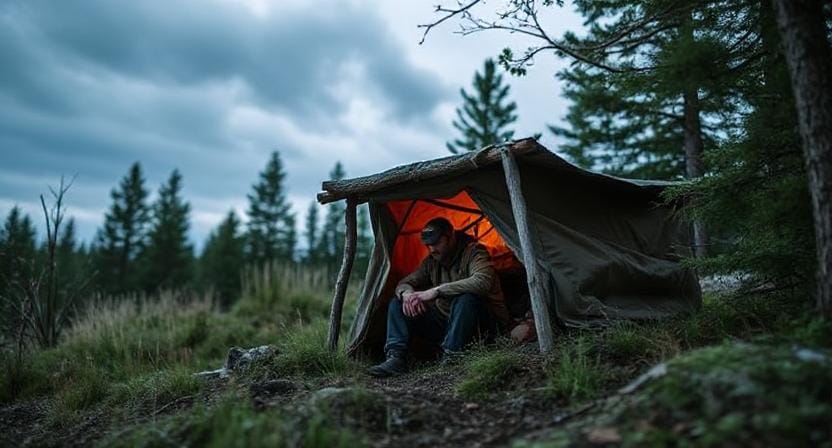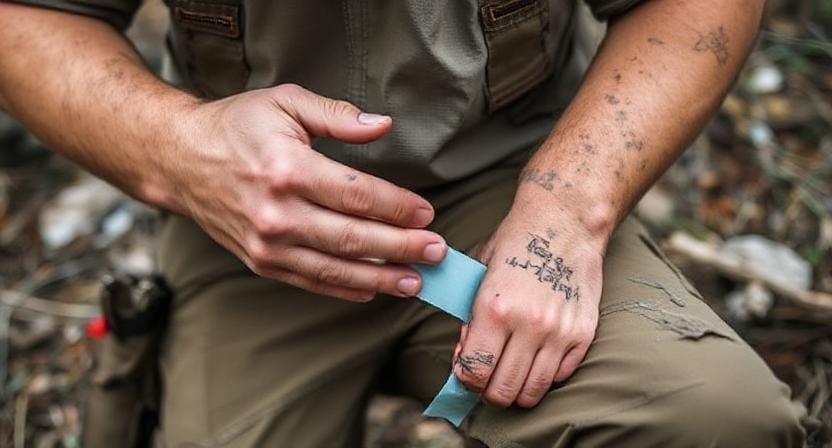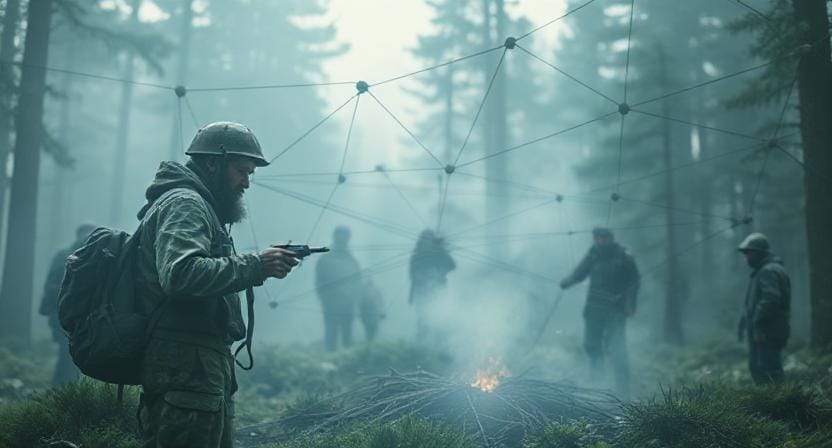Last Updated on November 1, 2025 by Kevin Collier

Top Takeaways and Key Concepts
- Ground yourself by observing surroundings, sounds, or textures to reduce anxiety.
- Move your body with stretches, walks, or light exercise to calm nerves.
- Practice deep breathing: inhale 4 counts, hold 4, exhale 6 repeatedly.
- Focus on controllable tasks and break them into manageable steps.
- Use creativity, social support, and humor to manage stress effectively.
When you're trying to stay alive, as when you're lost in the wilderness or stranded in a city mess, stress may really get to you. It's like when a grizzly jumps out at you. Whoa, right? Your heart is beating quicker than a squirrel on coffee. That's anxiousness creeping in, and it can be very hard to handle.
But here's some good news: you can deal with those feelings. You don't need to do difficult deep breathing techniques that make you feel dizzy instead of peaceful. Let's be honest and keep things simple.
Please Note: This post may contain affiliate links. If you click one of them, we may receive a commission at no extra cost to you. As an Amazon Associate, I earn from qualifying purchases.
Begin by becoming grounded. Take a look around. Look at, hear, or feel anything. It could be the sound of leaves moving or the feel of the ground under your feet. This helps you get out of that nervous state of mind.
Moving around is helpful too. Give your legs a little stretch. Take a walk. A little movement helps those nerves calm down. A little jog can make you feel less nervous.
Keep something you appreciate, like a funny joke or a favorite song, close to your mind. It can make you grin and make things better. Even at the craziest times, a good laugh can transform everything.
Being nice to yourself can do a lot of good. Don't forget that it's only a moment. You're doing your best. You have the abilities and tools to deal with whatever comes next.
Isn't it good to know that you can deal with that anxiety? So, when life throws you curveballs, use these easy tips to help you deal with them. It's all about being cool even when things seem crazy. You can do this!
Breathe Like Your Life Depends on It (Because It Might)

*** Shop for Survival Gear - Tools - Kits ***
Survival Gear - Bags and Backpacks - Knives - Boots/Footwear - Communication
Outdoor Cooking - Gloves - Hydration - Dry Boxes - Water Filtration Systems
Tents - Sleeping Bags - First Aid Kits - Multi-Tools - Flashlights - Fire Starters
Navigation - Survival Food - Night Vision - Headlamps - Stun Guns - Binoculars
Let's start with breathing. I mean actual, deep breaths, not the kind where you breathe in so quickly that you practically swallow your tongue. When we get stressed, our bodies go into fight-or-flight mode. This is wonderful if you're up against a bear, but not so great if you're just trying to figure out how to start a fire with damp matches.
You can tell your body to relax by paying attention to your breath. Try this easy method: take a deep breath via your nose for four counts, hold it for four counts (this is very important; don't just swell up like a pufferfish), and then slowly let it out through your mouth for six counts.
Do this over and over until you feel more calm than a cat in the sun. To be honest, it works great!
One day we went camping and got caught in a storm that we didn't expect. The wind was roaring louder than my uncle did when he lost at cards, and I could feel panic rising in me.
So there I was, huddled beneath a tarp practicing my “calm breathing” techniques, and surprisingly, they helped me stay focused on what I had to accomplish instead of stressing out over the weather.
Concentrate on What You Can Control

There will always be things you can't control when you're trying to stay alive. For example, rain clouds can decide to wreck your carefully planned picnic, or wild creatures might believe your granola bars are their new favorite snack (spoiler alert: they are). Instead of worrying about things you can't control, focus on what you *can* control.
If you've been lost while hiking (which I may or may not have done once or twice), don't worry about how far off course you've gone; instead, focus on locating shelter or signaling for help.
Divide jobs into smaller parts and do them one at a time. “Just take it one scoop at a time!” my granny used to remark while she was making cookies.
This method keeps your mind busy and makes you feel less helpless, which is a good way to succeed even if the cookies burn!
Be like MacGyver

Let's be honest: sometimes we have to be creative to stay alive, as when you're looking for something to eat at camp and realize that last week's leftovers might be “survival food.” When you're feeling very stressed or anxious, using your creativity can be very helpful.
Remember when you had to make do with what you had? For example, you used duct tape as an emergency bandage or turned an old rucksack into a fishing net (I'm still waiting for my Nobel Prize nomination).
When you work on solving problems, you keep your mind busy and give yourself abilities that could really help you out.
Studies reveal that being creative can actually lower stress levels a lot, which is interesting. So the next time you feel like you can't handle what's going on around you, or if all else fails and you only have cold pizza left, try crafting something helpful out of things you find laying around.
Make a Network Of People Who Can Help You

It's not enough to be physically strong to survive; you also need to be emotionally strong. Having friends beside you makes everything simpler! When things get tough, think of them as backing singers in life's crazy show. They keep things in tune!
During one very scary forest trip where mosquitoes were bigger than little birds (literally), my pals and I made our own support group by the campfire.
We told each other funny stories about our biggest fears, like spiders falling on our heads, and laughed until we forgot why we were freaked out in the first place.
When you share experiences and support one other through tough situations, like hiking through thick woods or dealing with life, you make connections that make everyone stronger! Plus, who doesn't like getting to know someone over snacks?
Stay Active: Get Moving to Get Rid of Stress
Last but not least, let's talk about movement. Nothing gets rid of tension like exercising your legs, even if it's only running away from imagined bears! Exercise releases endorphins, which are chemicals that make you feel better. This implies that even while you're in danger, you'll feel better.
When we got trapped on another camping trip because of severe weather (again!), we decided to have an impromptu dance party beneath tarps instead of staying indoors all day and feeling sorry for ourselves. It sure looked goofy, but it sure made people feel better!
So, whether you want to go for a quick walk around camp or do some silly dance steps around the fire after supper, start moving! Moving around not only helps us relax physically, but it also helps us relax mentally by providing us space and sending those annoying worries somewhere else!
Frequently Asked Questions
Why does stress increase during a survival situation?
Physical danger, uncertainty, isolation, and lack of control can trigger the body’s stress response and raise anxiety levels.
How can grounding techniques help calm anxiety?
Grounding shifts focus to your senses and surroundings, helping the brain exit panic mode and regain clarity.
Does moving your body reduce stress?
Yes. Light exercise, stretching, or walking helps release tension and supports calmer thinking.
Why is controlled breathing recommended?
Slowed breathing activates the parasympathetic nervous system and lowers heart rate, which reduces anxiety.
Can small tasks help reduce overwhelm in emergencies?
Breaking actions into small, achievable steps restores focus and prevents mental overload.
Does humor really help during survival stress?
Positive distraction, humor, and shared laughter can relieve tension and boost emotional resilience.
Is creativity useful when stressed in survival mode?
Channeling energy into problem solving keeps the mind engaged and turns stress into productive action.
Suggested Resources:
10 Ways to Manage Stress in Crisis Situations
https://www.psychologytoday.com/us/blog/the-moment-youth/202006/10-ways-manage-stress-in-crisis-situations
How Nature Can Help Reduce Stress
https://www.healthline.com/health/nature-stress-relief
The Science Behind Deep Breathing
https://www.health.harvard.edu/mind-and-mood/the-science-behind-deep-breathing

Kevin Collier is a seasoned survivalist and expert in prepping and homesteading, contributing to WiseSurvive.com. With a deep-rooted passion for self-sufficiency and outdoor survival skills, Kevin shares practical advice, strategies, and resources to help individuals prepare for any challenge. His informative articles cover a range of topics, from essential survival techniques to sustainable living practices, empowering readers to thrive in any situation. Whether you're a novice or a seasoned prepper, Kevin's insights will inspire you to take charge of your readiness and build resilience for the future.




